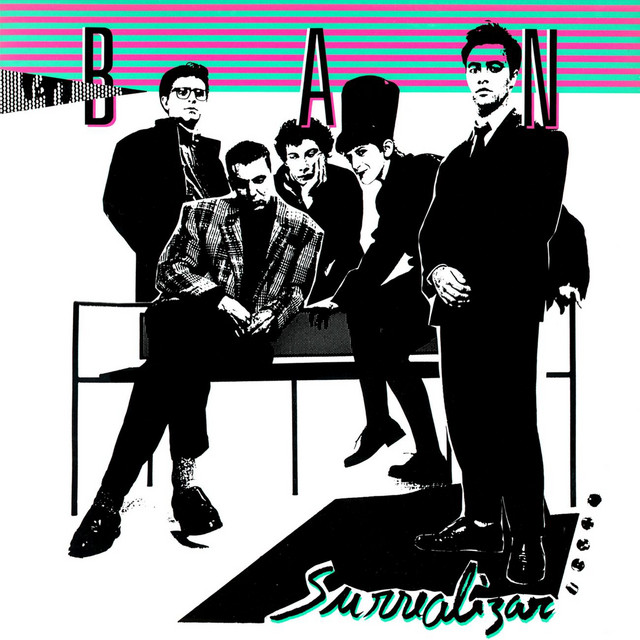Ban is a Portuguese pop/dance/rock band formed in 1981.
Ban is a band from Porto that was formed in 1981. Initially they intended to be a New Wave and Ska band and their name was Bananas. In 1983, the band was formed by João Loureiro (vocals and keyboards), João Ferraz (guitar), Paulo Faro (drums) and Francisco Monteiro (bass). Jorge Romão (GNR, the group with which they shared the rehearsal room) was also part of the initial formations, and at that time they won the Rock em Sock 7 Up contest, among more than 600 groups. They then edit the first single, Identity.
However, they shorten the name to Ban and bet on a more depressing sound, influenced by the Manchester Wave. During this period, they recorded the mini lp, Alma Dorida, with great success on alternative circuits and on pirate radio stations. They then gave important concerts at Rock Rendez Vous (Lisbon) and at the Novo Rock Cycles (Porto), of which João Loureiro was a mentor.
In 1986 they embarked on a more pop career that began with the maxi Santa, very well accepted by the specialized critics, with the participation of several guest musicians such as Nuno Rebelo (Mler Ife Dada), Ricardo Camacho (Sétima Legião) Tomás Pimentel, Paula Sousa or Zézé Garcia ((GNR, Urb).
The nine themes edited up to that point would later be included in the collection Documento 83-86.
Ana Deus joins the band and the bet on pop, with soul and dance music influences, becomes more evident and they successively record “Surrealizar” (1988), “Música Concreta” (1989) and “Mundo de Aventuras” (1991). ), a hugely successful trilogy that definitely makes them mainstream, with hits such as Irreal Social, Um Filme Semper Pop, Dias Atlântico, Suave, Excesse Aqui, Mundo de Aventuras or Rosa Flor. The production is by Paulo Neves.
In this trilogy, Ban achieve an international sound and for many sublime, mixing influences, ranging from dance and soul music to pop charm or even some experimental jazz (through Sei Miguel and Fala Mariam, guests in Música Concreta), and using to a great visual and sound sophistication, with pioneering use in Portugal of drum machines and sampling, and making remixes that become hits on dance floors such as Irreal Social and Mundo de Aventuras (in this case with the participation of Tó Pereira/DJ Vibe , in his first recording foray).
They then made three major national tours, with iconic concerts such as those at Estufa Fria or at Terreiro do Paço, in Lisbon, or at the Coliseu in Porto, having also passed through Spain and Macau.
For various reasons – some members had other options in life, and also due to some tiredness after intense tours – the Bans ended their activities.
In 1994 they made a final tour with Emília Santos in place of Ana Deus, as a promotion of the collection Num Filme Semper Pop, which brought together themes from the aforementioned trilogy.
They were, in 2007, caricatured by Gato Fedorento, in the program Diz que é uma Espécie de Magazine.
The group returned in 2010 with a new album called Dansity, a surprising and creative cd, this time in English, with a new female voice, Mariana Matos, and songs that stood out, such as Mod Girls, Funk It or Cool and Cruel. Remixes of the first two are also produced by Peter G and JohnWaynes.
In 2011, the newspaper “Correio da Manhã” published a book with the history of the group, written by journalist Pedro Rios, and a CD with some of the most representative themes of the Ban’s career, as they were considered by music critics of that publication of one of the national ‘Mythical Bands’.
In fact, they were also awarded by SPA as one of the 50 best groups ever in Portugal, and Mundo de Aventuras was considered by Blitz magazine as one of the 30 best albums ever by Portuguese artists.
Other important musical projects for Portuguese Modern Music were born from its elements, such as Zero, DR Sax or Três Tristes Tigres.






[…] what he had already done with Táxi: he arranged an audition for João Loureiro dos Bananas (later Ban) in Lisbon, began negotiations with EMI–Valentim de Carvalho, launched the project commercially […]
“Que grande banda, grandes músicos, grande João Loureiro que parte da sua formação foi no Reino Unido e a grandiosa voz de Ana Deus, na altura a excelência da música moderna portuguesa estava ao nível do melhor que se fazia além fronteiras, músicos substantivos e cheios de tutano, poderia estar aqui o resto do dia a dar exemplos de bandas marcantes e de Top da cena música nacional de então, mas destes já não há mais!”
by O Senhor do Vinil – Alto e Bom Som
Super. Like it
Great band !! Rock
Great rock band I like it